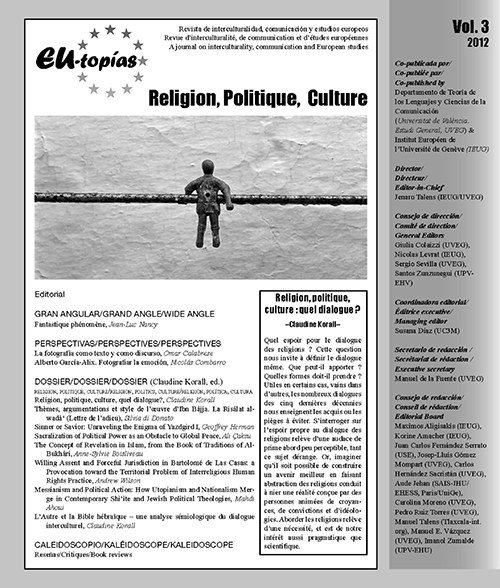The concept of revelation in Islam, from the book of traditions of al-Bukhârî
DOI:
https://doi.org/10.7203/eutopias.1.18494Keywords:
Islam, hadith, Sunna, Qur’an (Koran/Quran), Islamic dogma, tradition, Bukhârî, authority, recitation, rituals, beliefs, religious practice, interreligious dialogue Abstract
Abstract
The present article deals with the notion of revelation in Islam through the study of one of the sources of Islamic dogma: the Sunna or “tradition”, a corpus constituted of hadîths (accounts about the Prophet Muhammad or his companions). It investigates what information is provided about the Qur’ân in one of the most canonical collections of hadiths: the ?a?î? (“authentic”) gathered by Abû ‘Abdullâh al-Bukhârî (d. 256 h./870 CE). The first part shows that a substantial portion of the text was used to support and reinforce the status of the qur’ânic text, and the authority which proceeds from it. The second part analyzes the other important component of the speech about the Qur’ân: the speech about the qur’ânic reading-reciting-psalmody and about the bodily movements, postures, and conditions that accompany it. This research has shown the conceptualization of the relationship of the believer towards the Qur’ân as is put forth by the collection of hadîths of al-Bukhârî: the concept of an external relationship though the performance of qur’ânic recitation.
 Downloads
Downloads
 References
References
Bibliography
Sources
al-Bukhârî, ‘Abdullâh Muḥammad b. Ismâ‘îl, Ṣâḥîḥ al-Bukhârî, Tâmir, Muḥammad Muḥammad (ed.), Cairo: Mu’assasat al-Mukhtâr li-l-nashr wa-l-tawzî‘, 2004, 3 vol.
al-‘Asqalânî, Ibn Hajar, Al-Fatḥ al-bârî ‘alâ šarḥ ṣaḥîḥ al-Bukhârî, s.l., Dâr al-Fikr, s.d., 11 vol.
al-‘Aynî, Badr al-dîn, ‘Umdat al-qârî fî šarḥ ṣaḥîḥ al-Bukhârî, Egypt, Šarikat Maktaba wa Maṭbû‘a Muṣtafâ al-Bâbî al-Ḥalabî wa-awlâdih, 1972 (1322 h.), 1st ed., 20 vol.
Wensinck, Arent Jan, Concordance et indices de la tradition musulmane. Les six livres, le Musnad d’al-Dārimi, le Muwatta’ de Mālik, le Musnad de Ahmad ibn Hanbal, Istanbul, Cagri yayinlari, & Tunis, Maison Souhnoun, 1988.
Literature
Boekhoff-Van Der Voort, Nicolet, Versteegh, Kees, Wagemakers, Joas (eds), The Transmission and Dynamics of the Textual Sources of Islam, Leiden, Brill, 2011.
Boisliveau, Anne-Sylvie, « Le Coran par lui-même » : l’autoréférence dans le texte coranique, doctoral thesis, Université Aix-Marseille I, 2010, 580 p.
Brown, Jonathan, 2007, The Canonization of al-Bukhārī and Muslim. The Formation and Function of the Sunnī Ḥadīth Canon, Leiden, Brill, 431 p.
Burton, John, An Introduction to the Hadîth, Edinburgh, Edinburgh University Press, 1994, 210 p.
Daaif, Lahcen, book review of Brown, J. The Canonization of al-Bukhārī and Muslim, in BCAI 024.
Daaif, Lahcen, “Dévots et ‘‘renonçants’’ : l’autre catégorie de forgeurs de hadîths,” Arabica, 57, 2010/2, p. 201-250.
Goldhizer, Ignaz, Muhammedanische Studien, 2 vols, 1889-1890. Reed: Hildesheim et New York, Georg Olms Verlag, 1961. English translation: Muslim Studies, ed. by S.M. Stern, 2 vol. 254 p. and 378 p. French translation: Etudes sur la tradition islamique, Extraites du Tome II des Muhammedanische Studien, translation L. Bercher, Paris, Adrien-Maisonneuve, 1952, 357 p.
Hilali, Asma, “Compiler, exclure, cacher. Les traditions dites « forgées » dans l’Islam sunnite (VIe/XIIe siècle),” Revue de l’histoire des religions, 228 (2/2011), p. 163-174.
Juynboll, Gautier H.A., “Hadîth and the Qur’ân,” Encyclopedia of the Qur’ân, vol. 2, p. 376-397.
Juynboll, Gautier H.A., Muslim Tradition. Studies in Chronology, Provenance and Autorship of Early Ḥadîth, Cambridge UP, 1983, 273 p.
Juynboll, Gautier H.A., Studies on the Origins and Uses of Islamic Hadîth, Aldershot, Ashgate Variorum, 1996, 354 p.
Motzki (ed.), Hadîth. Origins and Developments, Aldershot, Ashgate Variorum, 2004
Motzki, Harald, Boekhoff-Van Der Voort, Nicolet, Anthony, Sean, Analysing Muslim Traditions. Studies in Legal, Exegetical and Maghāzī Ḥadīth, Leiden, Brill 2009, 520 p.
Schacht, Joseph, The Origins of Muhammadan Jurisprudence, Oxford, 1950.
Ware, Rudoph T., “Qur’ān Schooling, Society, and State in Senegambia, c.1600-2000” in Mamadou Diouf and Mara Leichtman (eds.) New Perspectives on Islam in Senegal, Palgrave, 2009.
Ware, Rudoph T., Launay, Robert, “Comment (ne pas) lire le Coran : Logiques de l’enseignement religieux au Sénégal et en Côte d’Ivoire,” in Gilles Holder (ed.), L’islam Nouvel Espace Public en Afrique, Karthala, 2009.
Downloads
Published
How to Cite
-
Abstract226
-
PDF81
Issue
Section
License
The authors conserve the copyright. All content published in EU-topías. Journal of interculturality, Communication, and European Studies are subject to the license Creative Commons Attribution-NonCommercial-ShareAlike 4.0 license. The full text of the license can be found at <http://creativecommons.org/licenses/by-nc-sa/4.0>
They may be copied, used, disseminated, transmitted and publicly displayed, provided that:
- The authorship and original source of the publication is cited (journal, publisher and URL of the work).
- They are not used for commercial purposes.
- The existence and specifications of this license of use are mentioned.
It is the responsibility of the authors to obtain the necessary permissions for images that are subject to copyright.



